'Elements' is a simple list of elements, without values or attributes. More...
 Inheritance diagram for Sabre\Xml\Element\Elements:
Inheritance diagram for Sabre\Xml\Element\Elements: Collaboration diagram for Sabre\Xml\Element\Elements:
Collaboration diagram for Sabre\Xml\Element\Elements:Public Member Functions | |
| __construct (array $value=[]) | |
| Constructor. More... | |
| xmlSerialize (Xml\Writer $writer) | |
| The xmlSerialize metod is called during xml writing. More... | |
 Public Member Functions inherited from Sabre\Xml\XmlSerializable Public Member Functions inherited from Sabre\Xml\XmlSerializable | |
| xmlSerialize (Writer $writer) | |
| The xmlSerialize method is called during xml writing. More... | |
Static Public Member Functions | |
| static | xmlDeserialize (Xml\Reader $reader) |
| The deserialize method is called during xml parsing. More... | |
 Static Public Member Functions inherited from Sabre\Xml\XmlDeserializable Static Public Member Functions inherited from Sabre\Xml\XmlDeserializable | |
| static | xmlDeserialize (Reader $reader) |
| The deserialize method is called during xml parsing. More... | |
Protected Attributes | |
| $value | |
Detailed Description
'Elements' is a simple list of elements, without values or attributes.
For example, Elements will parse:
<?xml version="1.0"?> <s:root xmlns:s="http://sabredav.org/ns"> <s:elem1 /> <s:elem2 /> <s:elem3 /> <s:elem4>content</s:elem4> <s:elem5 attr="val" /> </s:root>
Into:
[ "{http://sabredav.org/ns}elem1", "{http://sabredav.org/ns}elem2", "{http://sabredav.org/ns}elem3", "{http://sabredav.org/ns}elem4", "{http://sabredav.org/ns}elem5", ];
- Copyright
- Copyright (C) 2009-2015 fruux GmbH (https://fruux.com/).
Definition at line 36 of file Elements.php.
Constructor & Destructor Documentation
◆ __construct()
| Sabre\Xml\Element\Elements::__construct | ( | array | $value = [] | ) |
Constructor.
- Parameters
-
array $value
Definition at line 50 of file Elements.php.
References Sabre\Xml\Element\Elements\$value.
Member Function Documentation
◆ xmlDeserialize()
|
static |
The deserialize method is called during xml parsing.
This method is called statictly, this is because in theory this method may be used as a type of constructor, or factory method.
Often you want to return an instance of the current class, but you are free to return other data as well.
Important note 2: You are responsible for advancing the reader to the next element. Not doing anything will result in a never-ending loop.
If you just want to skip parsing for this element altogether, you can just call $reader->next();
$reader->parseSubTree() will parse the entire sub-tree, and advance to the next element.
- Parameters
-
Xml\Reader $reader
- Returns
- mixed
Definition at line 102 of file Elements.php.
References $reader, and Sabre\Xml\Deserializer\enum().
 Here is the call graph for this function:
Here is the call graph for this function:◆ xmlSerialize()
| Sabre\Xml\Element\Elements::xmlSerialize | ( | Xml\Writer | $writer | ) |
The xmlSerialize metod is called during xml writing.
Use the $writer argument to write its own xml serialization.
An important note: do not create a parent element. Any element implementing XmlSerializble should only ever write what's considered its 'inner xml'.
The parent of the current element is responsible for writing a containing element.
This allows serializers to be re-used for different element names.
If you are opening new elements, you must also close them again.
- Parameters
-
Writer $writer
- Returns
- void
Definition at line 75 of file Elements.php.
References Sabre\Xml\Serializer\enum().
 Here is the call graph for this function:
Here is the call graph for this function:Field Documentation
◆ $value
|
protected |
Definition at line 43 of file Elements.php.
Referenced by Sabre\Xml\Element\Elements\__construct(), and Sabre\DAV\Xml\Property\ResourceType\getValue().
The documentation for this class was generated from the following file:
- libs/composer/vendor/sabre/xml/lib/Element/Elements.php




